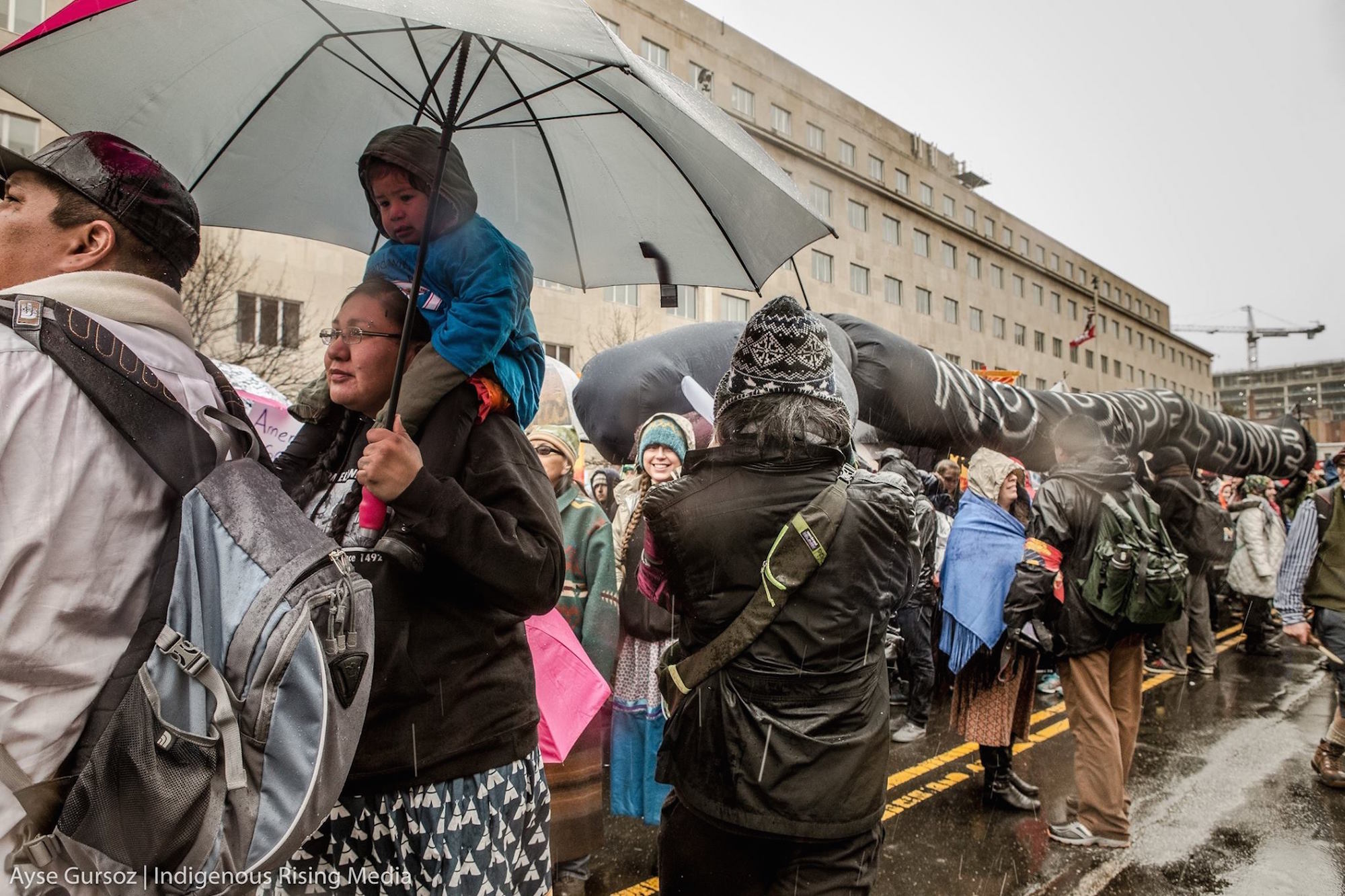Scientists agree: to avoid even more dangerous impacts of climate change, the majority of coal, oil, and gas reserves must stay in the ground, and the burning of fossil fuels must end by 2050.
RAN’s climate campaign is working to keep global temperature change to under 1.5 degrees Celsius, protect human rights, and strategically push the decline of the most climate-destructive fossil fuel industries. The fight against the Dakota Access Pipeline near the Standing Rock Sioux Reservation was a turning point for the U.S. climate movement. The unprecedented coordination and solidarity between longstanding Indigenous-led struggles and national climate justice campaigning organizations formed a powerful coalition that points the way towards game-changing wins going forward.
To ensure our future, and a liveable climate, we must support Indigenous land rights and stop expanding the very industries that are causing climate destruction. This means no new extraction of oil, gas, and coal, and no new infrastructure (like pipelines and terminals) that drives new extraction. This is one of the most important steps to transition us to a healthy climate and a just future. To get there, we must stop the banks and insurance companies backing these dirty and destructive projects.
Banks and Insurance Companies must stop the money flow to new fossil fuel infrastructure.
New projects need money, and we’ve gone straight to the source.
To start a new infrastructure project like a pipeline or export terminal you need money, a lot of money. There is a tight-knit group of industries, and companies, that are driving this climate crisis and choosing record profits over people, planet, and climate.
In fact, since 2016, 35 banks have poured $2.7 trillion into fossil fuels. Without this financial backing, fossil fuel industries could not expand a practice that is so destructive to people and the planet.
New fossil fuel infrastructure projects also need insurance. Just like you can’t drive a car or buy a house without insurance, energy companies can’t build or operate destructive fossil fuel projects like pipelines, coal-fired power plants, or fracking wells.
The insurance industry is supposed to protect us from catastrophic damages – like the fires, flooding, and storm damage caused by the climate crisis. So WHY are insurance companies actually supporting fossil fuel projects that they’ll ultimately have to pay damages for? Because of profit.
People are fighting new infrastructure projects and winning.
Banks and insurance companies have the power to change the world by withholding financing and insurance from any new fossil fuel projects. People power is putting the pressure on these companies to be on the right side of history.
For over a decade, a powerful coalition of First Nations, ranchers and farmers, environmentalists, youth fighting for their future, and people from all walks of life have resisted the construction of the 1,179-mile Keystone XL pipeline that would flow 830,000 barrels of oil a day from the Alberta tar sands to Nebraska, eventually heading to refineries on the Gulf Coast.Across Canada, protests erupted in solidarity with the Wet’suwet’en struggle against the Coastal GasLink pipeline. Indigenous peoples and allies gathered at government buildings throughout the country, blockading the offices of Coastal GasLink and its financial backers, and shutting down ports, railways, streets, and bridges.
One community is fighting three proposed LNG export terminals in the Rio Grande Valley, Texas, near the Mexico border, where fossil fuel corporations plan to transform the coastal landscape of the Rio Grande Valley into an industrial LNG export hub. If built, the LNG terminals could significantly impact the local fishing, shrimping, and eco-tourism industries, with 500-foot tall flaring towers, the release of millions of gallons of effluent water, and the brown haze that would come with the estimated quadrupling of local air pollution.
These are just a few of the communities rising up against fossil fuel expansion.
Pressuring banks gets results.
Over the past 3 decades, RAN has fought corporate power — including Wall Street banks — who are funding the climate crisis and infrastructure. At the heart of all of our work is a commitment to Indigenous Rights, human rights, and justice. RAN’s climate team works with frontline communities and partners to demand a rapid exit of the most climate-destructive fossil fuel subsectors: tar sands, coal mining and power, and liquefied natural gas export.
Pressuring banks to move away from fossil fuels has real results. Big banks have moved away from coal, with five of the six biggest Wall Street banks committing to reduce their lending to coal mining, and a total of 24 global banks putting in place new policies to move away from the coal sector.Many banks, including JPMorgan Chase, have cut back funding of coal and dumped the financing of Arctic oil and gas projects. But there is still more work to be done.
The transition to a clean energy future is underway, and our lives literally depend on scaling it up rapidly. Big banks and insurance companies need to defund climate change for good by swiftly, and justly, exiting from coal, and cutting extreme oil and gas.
